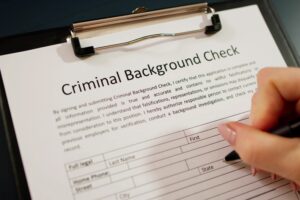
Losing your driver’s license is a consequence of violating Texas’ DWI laws. The duration of the license suspension depends on the number of past offenses, typically ranging from 90 days to two years. Working with an experienced Dallas DWI lawyer can simplify the process of reinstating your license after the suspension period has ended.
The Law Offices of Randall B. Isenberg can improve your chances of getting your Texas license reinstated by overseeing each step with precision. Connect with us during a free consultation or read on to learn more about the DWI license suspension waiting periods and the next steps to take to have your privileges fully returned.
Overview of License Suspension in Texas for DWI Offenses
In Texas, a DWI arrest or conviction can lead to the determined suspension of your driver’s license, causing inconvenience in your daily activities. License suspension can occur administratively or as a criminal consequence of violating DWI laws in Texas.
Administrative license suspension happens 40 days after a DWI arrest. To avoid administrative license suspension, our Dallas criminal defense lawyer can request an administrative hearing within 20 days of your arrest or 15 days of receiving a suspension notice. Additional factors that can result in administrative license suspension in Texas include:
- Being under 21 years old and registering a detectable alcohol level
- Refusing or failing to complete a DWI test
- Registering a blood alcohol concentration (BAC) of 0.08% or higher while driving a non-commercial vehicle
An administrative license suspension for a DWI can last from 180 days to three years. If aggravating circumstances are present, such as multiple DWI offenses involving a commercial vehicle, you may face a lifetime loss of your driver’s license.
License suspension due to a DWI criminal conviction is a separate process from the administrative suspension. Therefore, even if you win the administrative hearing, the court can still order the suspension of your license.
What Steps Should I Take to Restore My Texas Driver’s License After a DWI Offense?
To regain your driver’s license after a DWI suspension, you must follow specific steps. This involves submitting paperwork and paying fees for license reinstatement. To check your eligibility, visit the Texas Department of Public Safety (DPS) website.
To access the website, provide your ID or driver’s license number, birth date, and the last four digits of your Social Security Number. Once logged in, you can see the status of your license suspension and the necessary reinstatement requirements. If you’re not yet eligible, continue checking the website or consider applying for an occupational license.
When you’re eligible, gather the required compliance documents for reinstatement. In Texas, the reinstatement requirements include:
- Completion certificate for the court-ordered drug or alcohol education program
- Payment of reinstatement fees and other applicable administrative fees
- Completed forms
- Copy of your suspension notice
- SR-22 certificate (proof of financial responsibility) from your auto insurance provider
You have convenient options for making payments and submitting documents for reinstatement. You can do this easily online through the Department of Public Safety (DPS) website. Alternatively, you can send your application and supporting documents by mail, fax, or email (if submitting online, convert documents to PDF format).
Make sure to include your full name, date of birth, and driver’s license number on all documents. Processing reinstatement requests by the DPS usually takes about 21 business days.
How Do I Obtain an SR-22 Certificate for DWI License Reinstatement?
To reinstate your driver’s license after a DWI offense, you need an SR-22 certificate. This certificate serves as proof of financial responsibility and allows Texas DPS to ensure compliance with auto liability requirements.
Here are the steps for obtaining an SR-22 certificate:
- Contact an authorized insurer. Check with your current insurance provider to see if they offer SR-22 certificates.
- Pay the required SR-22 fee, which varies depending on the insurance company.
- Complete the application process and request your insurer to file the certificate directly with the DPS or submit it to the DPS via mail or in person.
If you don’t own a vehicle, you can apply for a non-owner SR-22, which is usually more affordable. It’s important to note that a DWI conviction and the need for an SR-22 certificate often lead to higher auto liability insurance rates. Insurers consider drunk driving a high-risk behavior, resulting in increased premiums.
The SR-22 certificate is not a separate form of insurance but rather a document that verifies you have the minimum auto liability coverage, including:
- At least $30,000 of bodily injury coverage per person injured in an accident
- $60,000 bodily injury coverage per accident
- $25,000 property damage coverage per accident
Understanding DWI Surcharges and Their Impact on License Reinstatement
DWI surcharges are penalties imposed by DPS for DWI convictions. These surcharges must be paid for up to three years after a DWI conviction or if a blood/breath test indicates a BAC of 0.6% or higher. They can be quite expensive, potentially costing thousands of dollars, and can prevent the reinstatement of your driver’s license even after the suspension period ends.
Many individuals convicted of a DWI face difficulties in paying these surcharges, which poses a challenge in restoring their licenses once the suspension period is completed.

Are There Any Alternatives to Getting a License Back After a DWI Suspension?
During a DWI suspension period, a provisional license is a temporary driver’s license that allows individuals to drive for essential purposes despite their regular license being suspended. It is also known as a restricted or hardship license.
To obtain a provisional driver’s license during your DWI license suspension period, a DWI attorney from the Law Offices of Randall B. Isenberg can file a petition with the local court. The specific forms and procedures may vary depending on your jurisdiction. When applying, you will be required to submit several forms, including:
- A certified copy of your driving history, which includes details of past driving offenses, arrests, convictions, and previous license suspensions or revocations.
- An SR-22 certificate from an insurance provider.
- A letter from your employer stating your position and the necessary driving hours.
- A letter explaining the reasons for your provisional license application, including your schedule and the locations you need to drive to.
The presiding judge will review your request and, if approved, issue a court order. You must then submit this court order to DPSto obtain the official provisional license. Additionally, you will need to pay a reinstatement fee to the DPS for the issuance of your provisional license.

What Are the Requirements and Eligibility Factors for Reinstating a Provisional Driver’s License?
If your petition for a provisional license is granted and you receive one, it’s important to note that you must adhere to the following requirements:
- Carry a certified copy of the court order whenever you drive.
- Attend alcohol dependence counseling at an approved facility.
- Install an Ignition Interlock Device (IID) in your vehicle.
However, it’s essential to understand that the issuance of a provisional license is not guaranteed. The judge may deny your request or impose a waiting period based on certain factors that make you ineligible for a provisional license:
- A waiting period of 90 days if you have another drug or alcohol-related license suspension.
- A waiting period of 180 days if your license was suspended due to an intoxication conviction.
- A waiting period of one year if you have two administrative license suspensions on your record.
- Requesting the license for a commercial vehicle.
Additionally, this license remains valid for one year, and you cannot obtain the license for more than two years.
How to Get Your Commercial Driver’s License Back After a DWI Suspension
Texas imposes strict DUI rules for commercial drivers. In Texas, operating a commercial vehicle with a BAC of 0.04% or higher leads to a DWI charge. The arresting officer issues a suspension notice upon arrest.
The DPS can also suspend your CDL if you drive a non-commercial vehicle while intoxicated. Your driving record, including non-commercial offenses, affects your CDL status.
- To contest a CDL DWI suspension and get your license back, request a hearing within 20 days (15 days for administrative suspensions). Contact an attorney immediately after a DWI arrest to understand the process, prevent suspension, and prepare a strong defense.
- The Texas DPS schedules hearings within 120 days. Inform your employer of any conviction within 30 days.
- If you disagree with the judge’s decision after the hearing, you have 30 days to file an appeal. Send the appeal petition to the Department of Public Safety.
How Long Can a CDL License Suspension Last?
The suspension durations for CDLs in Texas are as follows:
- At least one year for alcohol-related offenses.
- At least three years for transporting hazardous materials while intoxicated.
- Lifetime suspension for a second alcohol-related offense.
- Check your license status on the Texas DPS website using your ID or driver’s license number, birthdate, and last four digits of your SSN. Pay fees and submit required documents to reinstate your license.
In some cases, a lifetime suspension can be reinstated after ten years if you complete an approved program and pass vision and skills tests. The DPS reviews your driving record before approving a CDL request.
Reinstatement for a lifetime suspension applies to specific offenses, such as DUI, high BAC, chemical test refusal, leaving an accident scene, or using a commercial vehicle in a felony (except for drug manufacturing or distribution).
Trusted Legal Advocate for DWI License Reinstatement in Texas
If you or someone you know has a suspended license after a DWI charge in Texas, act swiftly and secure the assistance of a skilled DWI lawyer near you. The Law Offices of Randall B. Isenberg knows each jurisdiction’s requirements and can submit the required paperwork to have your Texas license restored.
Don’t face this complicated process alone – contact us today for a confidential and risk-free consultation.










